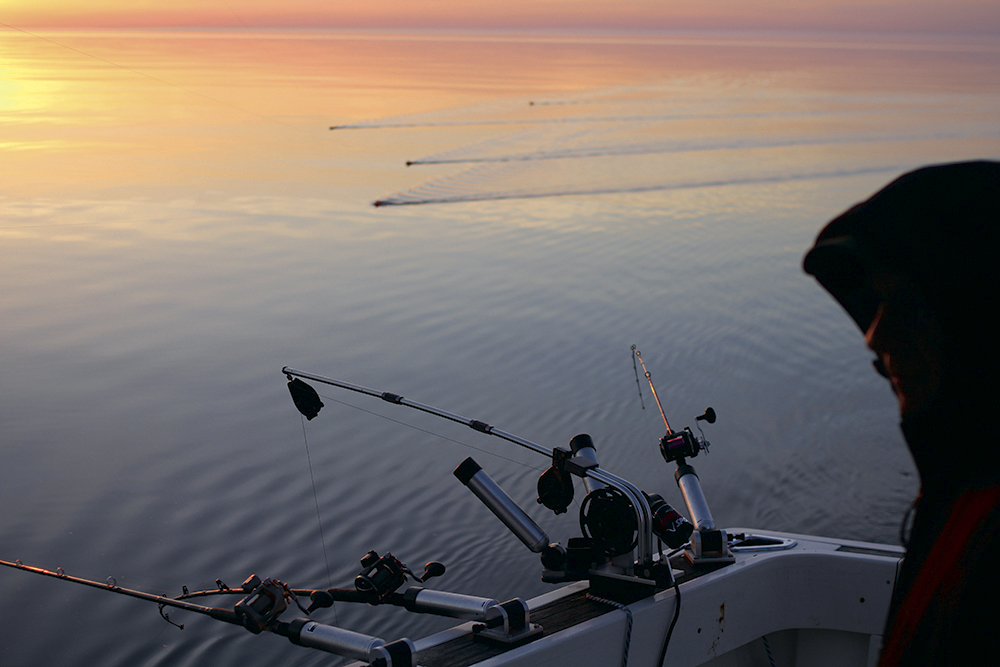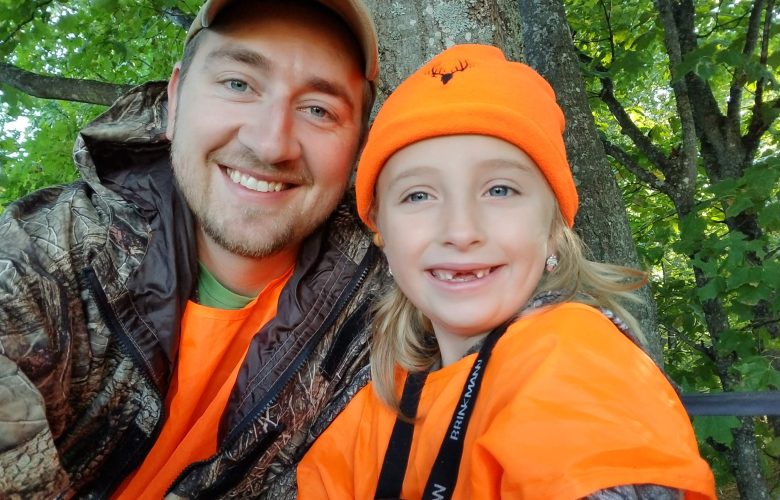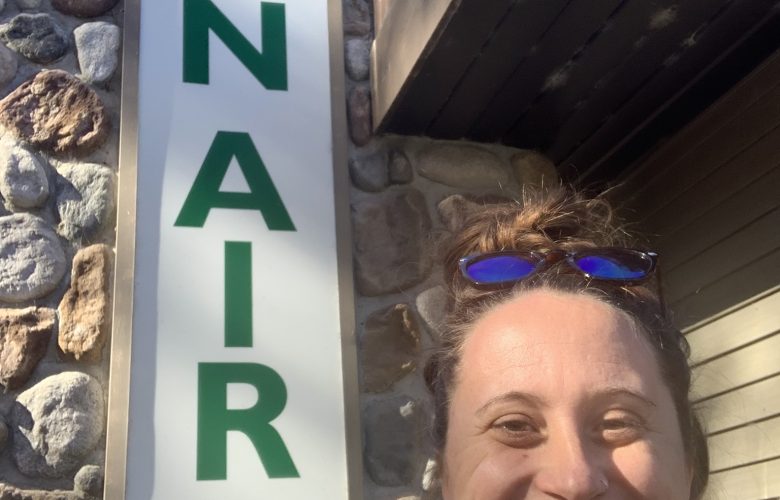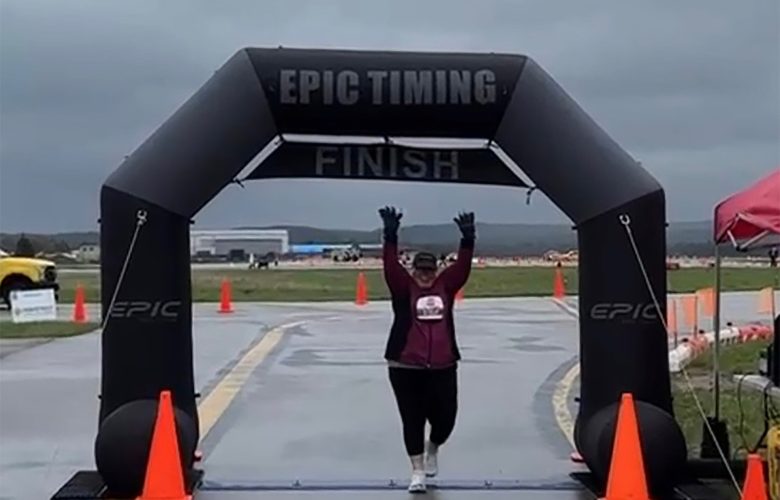One fish in the boat
My grandfather always said that trolling on Lake Michigan is only as enjoyable as the funniest person on the boat. This is truest if you don’t know how to catch fish. (Sorry Grandpa!) Mastering how to rig and run long-lines, planer boards, Dipsy Divers, and down-riggers in combination with myriad new lures and types of line becomes even more challenging when combined with atmospheric and seasonal changes that affect fish behavior.
Fortunately for Frankfort, Captain Dave Rommell has all the necessary expertise for a great time on the water, and he’s a really nice guy. Many of his clients are visiting families who just want a fun day and some fresh fish to take home, while others are experienced anglers who want to learn more about successfully targeting salmon and lake trout in specific ways or seasons. As a third-generation charter captain — likely the only one in Northern Michigan — after his grandfather, “Big Bob,” and father, “Little Bob,” as well as a third-generation bait and tackle store owner, Captain Dave can help you out. He can also tell you just about anything you want to know about the history and future of the local fishery.
Frankfort is Captain Dave’s hometown and a port he feels that people often overlook.
“It’s an old pet peeve of mine,” he said, “that Frankfort doesn’t get any of the attention, when in reality our fishing is every bit as good as in Manistee and Ludington.”
Throughout the spring of this year, it would have been easy to think that Frankfort provided the best fishing anywhere, since Captain Dave consistently landed daily limits on lake trout by trolling the prominent drop-off in Platte Bay.
“But we’re not going to do that today,” Captain Dave told The Betsie Current when we planned our trip for late May. As with any confident expert, he wasn’t going to chase easy-pickings to show off to a group of reporters and certainly not at the expense of a chance to learn new trends before anyone else in the area. “We’re going to see if any early [king salmon] have moved in yet. We probably won’t catch any fish, just so you know.”
We met at Jacobson’s Marina following almost two weeks of cool, foggy, and eerily calm lake conditions. I asked if he had updated his prediction for the evening’s catch as we motored past the Coast Guard station toward the historic lighthouse.
“If you wanted to pick the worst salmon-fishing conditions imaginable, it would look like this,” he said with a huff of laughter, looking out at the glass-smooth bands of water that trailed out before the boat into a bank of fog, as if guiding us toward disappointment.
While watching the sun set and waiting for something to bite, we talked gear. Increasing water clarity in Lake Michigan makes lures more visible earlier in the season and later each evening than ever before, meaning more opportunities for success exist along with greater pressure on the quality of an angler’s “presentation,” or the way that the lure, line, and movement combine to entice a fish to strike.
Many Great Lakes salmon trolling techniques and the gear that they require were perfected off the coast of Washington state and the relatively new adoption here of meat rigs — which present salted fish filets inside of flashy harnesses — are no exception.
“The new stuff is scary to some people,” he said. “You can end up with a tangled mess.”
A mess that is both expensive and useful only for salmon.
While new gear is often great, Captain Dave’s wife Amanda lamented, “He’ll buy bins of yard sale stuff if there’s even one Jensen chrome fluted lure in there because it’s his favorite, and Jensen doesn’t make it anymore.”
“Change of plans,” Captain Dave said to his father Little Bob, who had been piloting the boat in silence. At 3.3 miles offshore in 171 feet of water, the surface temperature dropped suddenly from 53 to 46 degrees. “We’re gonna stop here. This is ideal for steelhead.”
Father and son set four planer boards and three downriggers so quickly to target fish in 60 feet of water that I hardly had time to long for a stopwatch. We trolled northward for several hours with no bites. As it turned out, one flawless 10-pound steelhead was our only catch that evening. One fish at least meant that he would not be refunding the price of the trip, his guarantee, which he has only had to do twice in 11 seasons of chartering.
Two weeks after our trip, I dropped into Big Bob’s Up North Outfitters — the store that the Rommells own on Main Street in Frankfort — just to talk shop. Amanda was there, but Captain Dave was on the water. The door chimed after a few minutes and, instead of a Sunday customer, a petite woman entered carrying a towering trophy. The brass plate on its base recorded each winner of the Bihlman Memorial Fishing Tournament since 2000. Conspicuously absent from the list were Captain Dave and his Tiny Bubbles Charter Fishing. How could this be?
“He’s not competitive at all,” Amanda told me. “Dave’s not a tournament kind of guy.”
But the Bihlman is for a good cause, so Captain Dave, Little Bob, and a crew of about half a dozen other family members and friends had entered. Entry fees and donations to the tournament benefit Camp Quality, which offers “a chance for kids with cancer to just be kids,” in the words of a former camper who spoke before the prize ceremony.
An hour later, we gathered under the Mineral Springs Park pavilion for the tournament’s weigh-in. Topping the list was Captain Dave Rommell with a two-fish combined weight of 29.45 pounds. I found him — tanned red and laughing with everyone who passed by — cleaning large chrome-bright kings on the tailgate of a Chevy pick-up. A retired couple had just asked him for some salmon to take home; the fish had been donated by the fishermen, and there was a line of people waiting to grab a bag of filets to take home for a donation to Camp Quality.
“Whatever you want to donate. It’s for the kids,” Captain Dave said, dropping pink filets into a Ziplock bag.
While some charter captains and bait shop owners can be prickly about their secrets, Captain Dave makes sure that everyone can take part in the fun, whether they charter with him or merely stop into Big Bob’s for some friendly advice. Stop by and ask him what presentations he used to catch his trophy kings for the Bilhman Tournament. He’s sure to tell you with a smile.
Be sure to check Big Bob’s always up-to-date “Fishing Report” at www.Bigbobsupnorth.com before you plan your next trip out on the water.




